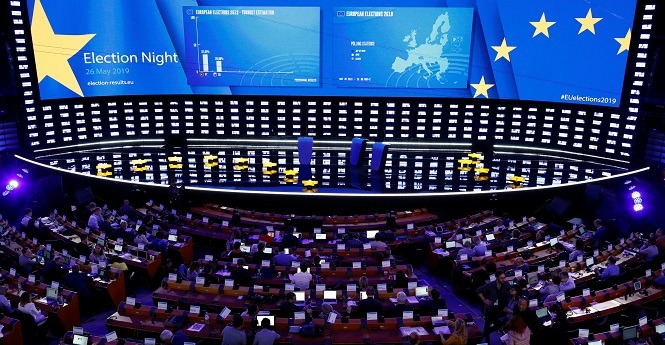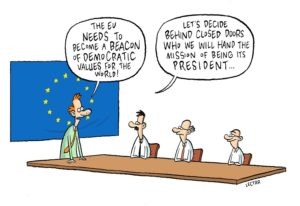With the next few months set to be dominated by unseemly haggling over top EU jobs, starting with the presidency of the European Commission, it may feel like business as usual in Brussels. But if you take the longer view, there are good reasons to hope that EU democracy may be evolving in a positive direction.
For the first time, the campaign for this year’s European Parliament elections had a genuinely pan-European feel. Voter turnout was also sharply up, giving the newly elected legislature greater legitimacy. What’s more, the longstanding grand coalition of the centre-right and the centre-left has lost its majority, breaking the stranglehold that backroom powerbrokers had over previous parliaments. That should make debates more lively and decision-making more openly democratic. And with far-right nationalists divided, pro-EU reformers have a chance to shine. Will they take it?
The EU has suffered crisis upon crisis over the past decade: the euro’s near-death experience, the unduly harsh austerity, the diesel scandal and the inadequate response to climate change, the panic about refugees, Brexit and the resurgence of far-right nationalism, and much else besides.
But one silver lining is that these crises are helping to create a common European politics. Many of the issues that Europeans care about – like migration and climate change – cut across national borders. So there has always been a clear rationale for handling them at EU level, or for the EU to act collectively in global forums that address such issues. But until recently, the political debate about such cross-border issues still took place largely along national lines. That is now changing.
For all the recent focus on their negative aspects, social media like Twitter and Facebook also have a hugely positive impact on European politics. They allow news to spread, people to interact, common responses to form and campaigns to be organised across borders.
A common European politics is thus emerging from the bottom up, not the top down. Forget the grotesque farce of Manfred Weber, the German candidate for the presidency of the European Commission of the centre-right European People’s Party (EPP), launching the EPP election campaign in Greece at a media stunt with no voters present.
The real boost to a common European politics comes from the mobilisation of European citizens, primarily online. No doubt that is one reason why turnout jumped from 42.5% to 50.5%, providing a shot in the arm for European democracy.
Fragmented but more democratic
Another reason for increased voter engagement is that the efforts of far-right nationalists to – oh irony – collaborate internationally, prompted a fightback from internationalist Europeans. The likes of Donald Trump, Vladimir Putin and Nigel Farage all want to bury the EU. And their kindred spirits like Italy’s Matteo Salvini, Hungary’s Viktor Orban and France’s Marine Le Pen successfully rallied many voters under the banner of a “Europe of Nations”.
But they also mobilised many Europeans, not least young people, who may previously have taken the EU for granted. Those pro-European reformers are now set on ensuring the Union survives and changing it for the better. Common enemies can often be a unifying factor.
With luck, these stirrings of a fresh, new, common European politics will now carry over to the often-sterile debating chamber of the European Parliament. Both the EPP and the Socialists and Democrats (S&D) lost seats, and with it, their collective majority. As a result, they will no longer be able to carve up the top jobs and stitch up proceedings between them.
The bad news is that far-right nationalists of various kinds gained ground. Indeed, they came top in four of the six biggest EU countries: France, Italy, Britain and Poland. But they did worse than expected in Germany, Spain, the Netherlands and Denmark. And while their threat remains very real, their influence in the parliament will be limited so long as they remain spread across several political groups.
The good news is that the winners also include pro-EU reformers: both the Greens and the liberals, who are allied with French President Emmanuel Macron’s party. Since their support is now needed for a pro-EU parliamentary majority, they are in a strong position to advance a bold agenda on issues such as climate change, EU reform and combating corruption.
For sure, there is a concern that if majorities are harder to muster, EU legislation may grind to a halt. A more democratic EU may end up being a less effective one.
But in general, greater checks and balances are a good thing. Promising legislative proposals could surely be improved by greater scrutiny and debate – and bad ones blocked. A more questioning Parliament would also help keep the Commission, which proposes EU legislation, and the European Council, which must approve it together with the Parliament, on their toes.
Last but not least, a more fragmented Parliament may be less prone to be captured by corporate interests. The Greens, for example, opposed the shameful decision to relax EU emissions standards after German carmakers were found to be cheating diesel-vehicle emission tests.
Horse trading about top posts
There are good reasons to be hopeful for the future. But unfortunately, the next few months are set to show the EU at its grubbiest. New presidents of the European Commission, European Council, European Central Bank (ECB) and European Parliament need to be chosen, as does the High Representative for Foreign Affairs and Security Policy.
The fortunate five ought to be selected on the basis of their personal qualities and relevant experience, with equal opportunities for candidates of different backgrounds. Instead they are likely to be chosen primarily on the basis of political horse-trading between national capitals and among EU institutions in Brussels.
© Lectrr
The immediate priority is the appointment of the new European Commission president. Legally, he or she – until now it has always been a man – is nominated by the European Council, by qualified majority, and must then muster a simple majority in the Parliament. But in 2014, the Parliament foisted its choice – Jean-Claude Juncker, the EPP candidate – on to reluctant EU leaders. This time many EU leaders – not least President Macron – are keen to ditch this Spitzenkandidaten system and choose someone more to their liking from a wider talent pool.
The first opportunity for the Parliament to elect the new European Commission President is in July but it could take more time if the Parliament cannot muster a majority for its candidate or if the candidate will not be accepted by the Council. At the time of writing this article, speculations were rife about who may become next European Commission president.
While the EPP remains the largest group in the Parliament, its diminished numbers will make it harder for its uninspiring and poorly qualified candidate, Manfred Weber, to impose himself. As a member of the Bavarian sister party of Angela Merkel’s Christian Democrats (CDU), he formally has the backing of the German Chancellor – for now. But a weakened Merkel is unlikely to expend much political capital on his candidacy.
For sure, Parliament has a collective interest in asserting its right to choose the next Commission president. But Weber will not readily command majority support there. He is unacceptable to many MEPs because of his previous closeness to Viktor Orban, Hungary’s far-right prime minister (and EPP member). Nor is a dirty deal with the S&D to share out the top jobs possible; the EPP would also need the support of the liberals or the Greens, which is unlikely to be forthcoming. And since the EPP grabbed all the presidencies in 2014, even the S&D owe it few favours.
The S&D candidate, Frans Timmermans, is bright, widely respected and better qualified than Weber, having been Juncker’s deputy at the Commission and before that Dutch foreign minister. But since the EPP got more seats than the S&D, it is unlikely to rally behind him. And an alternative coalition would require an implausible coalition of the Socialists, liberals, Greens and the far-left.
Alternative candidates
That opens to the door for alternative candidates. Christine Lagarde, who has done a fine job leading the International Monetary Fund (IMF), is one possibility. As a former French finance minister from the EPP, she has a lot going for her. But she would need to leave her job at the IMF early, and her successor would require the approval of President Trump. Another strong female candidate is the current Danish commissioner for competition, Margrethe Vestager, who is supported by the liberals.
Another plausible candidate is Michel Barnier. He is French, of the EPP and desperately wants the job. Above all, he has earned EU leaders’ respect for his deft handling of the Brexit negotiations – despite the UK parliament’s refusal to ratify his painstakingly negotiated deal.
Yet if Weber is denied the Commission presidency, Germany will press harder for another top EU job – even though it already holds many of them. Martin Selmayr, the dubiously appointed Secretary-General of the Commission, all but runs the Berlaymont. Klaus Welle, the longstanding Secretary-General of the Parliament, is likewise a power behind the scenes there. Germans also head up the European Stability Mechanism (ESM), the European Investment Bank (EIB) and the Single Resolution Board (SRB).
Angela Merkel would be a shoo-in for the presidency of the European Council if she wanted it, which she insists she doesn’t. Her former economic adviser and now Bundesbank president Jens Weidmann is angling for the ECB presidency. Since a German has never run the ECB, he would appear to have a strong case.
However, he vocally opposed the scheme that ECB President Mario Draghi devised to halt the panic that nearly destroyed the euro in 2012 and, more recently, its quantitative easing (QE) programme, which provided much-needed economic stimulus. Put simply, had Weidmann been ECB president in 2012, the euro might not have survived.
The same is true of one of the other candidates, Olli Rehn, who was the EU’s economic commissioner during the eurozone crisis. He was convinced that the solution to the financial panic was ever more austerity, not ECB intervention. He eventually became governor of the Bank of Finland, though would be a disastrous choice for ECB president too. Another Finn, Erkki Liikanen, might be a sounder bet.
The next few months will be unedifying. The stirrings of a European Spring of enhanced democratic engagement may fade. But once the new parliamentary term begins, it is vital that pro-EU reformers in all parties make their voices heard. Broader efforts to bolster EU democracy through transnational parties, citizens’ assemblies, European Citizens Initiatives and other forms of voter engagement also need to continue. To defeat the nationalists and address the burning challenges of our time, we desperately need a more democratic EU.
By Philippe Legrain



